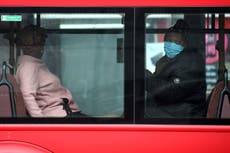Liz Truss seems to want to take the conversation on race back to the Fifties
The women and equalities minister dismisses concerns about racial and gender inequality as merely ‘fashionable’ in a crude attempt to appeal to white ‘Red Wall’ voters


Liz Truss, women and equalities minister, in her recent speech on the subject, has been trumpeted as heralding an exciting new approach to tackling inequalities.
In fact, there is nothing new about right-wing politicians trying to downplay and minimise the significance of racial injustice. And that is the underlying narrative of the Truss speech. It is as if she wants to take the conversation on race back to the 1950s when the institutions of the state did not acknowledge racism at all.
In that era, talking about race as an individual meant being dismissed as someone with a “chip on their shoulder”. In her speech, Truss takes care not address the lived reality of black people at all, except to dismiss it as “identity politics”.
There have been generations of struggle to get government to take racism seriously, whether it is institutional racism in immigration, as exemplified in the Windrush scandal, or institutional racism in policing, with recent Home Office figures revealing that black people are five times more likely to have force used against them by police in England and Wales than white people. The Truss speech seems to dismiss these type of concerns as merely “fashionable”.
But there is a whole section in her speech devoted to geographic inequality. She talks meaningfully about places “beyond the South East” and name-checks Wolverhampton and Darlington. Obviously politicians talking about regional inequality is commendable. But the framing of the Truss speech makes it clear that she thinks that equalities is a zero-sum game and that supporting the victims of racial injustice is somehow in opposition to supporting communities in the north of England. This is dog whistle racism designed to appeal to voters in so-called Red Wall seats.
Truss and her Tory colleagues obviously think that stoking racial resentment worked for Donald Trump in attracting millions of white voters in post-industrial America who had traditionally voted Democrat. So they think that it can work for them in holding on to white voters who have historically voted Labour in places like Wolverhampton.
Truss cannot be accused of not practising what she preaches in being careless about equalities. Since mid-July, she has appointed 253 people from outside government to new advisory roles connected to trade. But just 63 of these (24.9 per cent) are women. And while 240 are white, just 12 are Asian and only one is black. On equalities, Truss seems to model herself on her heroine Margaret Thatcher. As prime minister, Thatcher had fewer women in her cabinet than her male predecessors.
Astonishingly, for someone who is supposed to be equalities minister, Truss seems to reject data-driven policy and paying attention to outcomes. She boasts that her “new” policy focus will be “about individual dignity and humanity, not quotas and targets or equality of outcomes”. Presumably Truss does not want to look at outcomes because that would force her to accept that racial, gender and other types of what she calls “fashionable” inequality still exist.
This country has never needed a government prepared to take on racial inequality more. Coronavirus has shed an unforgiving light on inequalities of all kinds. The fact that disproportionate numbers of black people have died (at least 3,876 up to June of this year) would seem to be the type of outcome Truss does not want to focus on.
The Truss speech, far from representing a bold new initiative on equalities, is actually an attempt to turn the clock back. It is also a crude attempt to appeal to white Red Wall voters. We can only hope that voters, of all colours, see through Truss and her government.
Diane Abbott is MP for Hackney North and Stoke Newington




Bookmark popover
Removed from bookmarks